Key takeaways:
- Fostering open communication and healthy debates strengthens community bonds and encourages diverse perspectives.
- Collaborative creation of clear community guidelines ensures member ownership and adherence, reducing misunderstandings.
- Utilizing tools and feedback effectively enhances forum management, improves user experience, and fosters engagement.
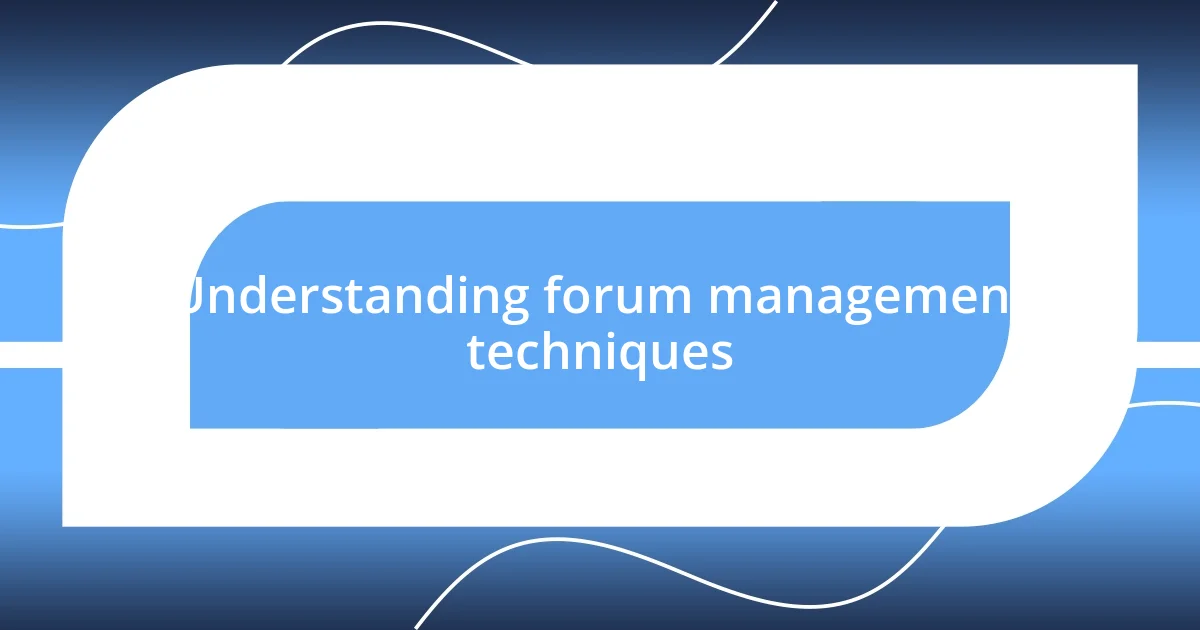
Understanding forum management techniques
Effective forum management techniques start with understanding the community’s needs. I remember when I first joined a niche forum; I was overwhelmed but also fascinated by the variety of voices. It struck me how critical it was for moderators to cultivate an environment where everyone felt heard and valuable.
One technique I’ve found invaluable is fostering open communication. Early on, I noticed a certain thread gaining traction. Instead of shutting down conflicting opinions, I encouraged healthy debates, which not only enriched the conversation but also created a sense of belonging among members. Wouldn’t you agree that when people feel safe to express their thoughts, communities grow stronger?
Building a clear set of guidelines is also a crucial aspect of managing forums. I learned this the hard way when I first saw chaotic threads spiraling out of control due to misunderstandings. Establishing straightforward rules not only helps maintain order but also sets an expectation for behavior that ultimately enhances user experience. Have you ever wandered into a forum only to be confused about what was acceptable? I know I have, and it definitely impacts the way you interact with a community.
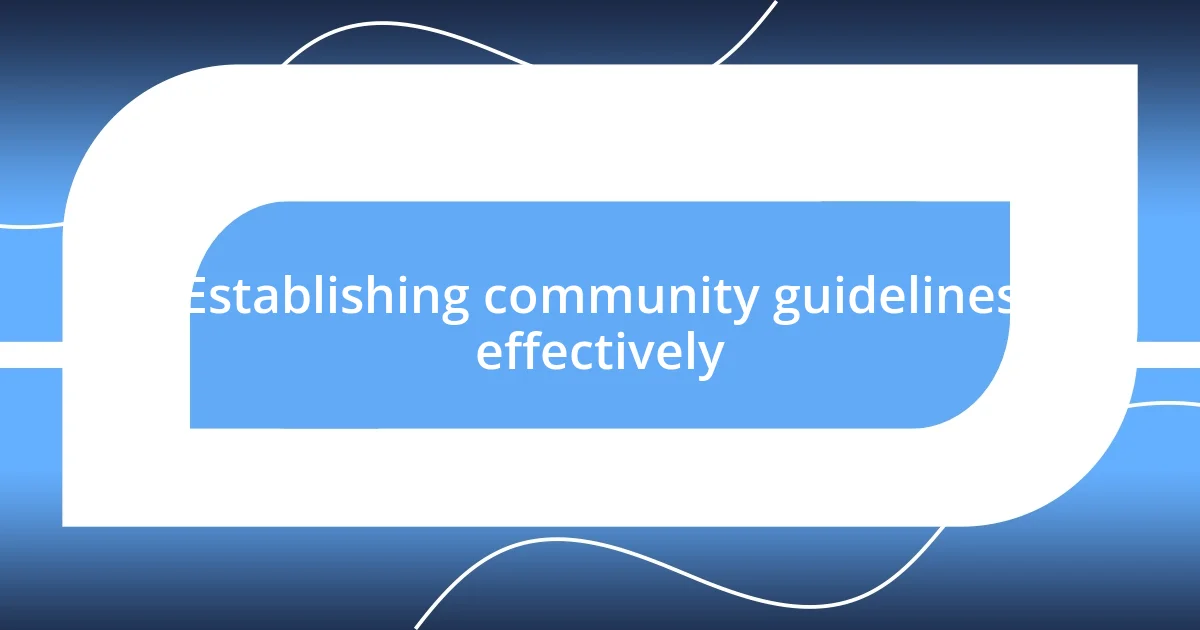
Establishing community guidelines effectively
To establish community guidelines effectively, it’s vital to involve the community in the creation process. I once participated in a forum where the guidelines were drafted by the members themselves. It felt empowering, like we were co-creating a safe space. The guidelines weren’t just rules; they were a reflection of our collective values. This approach led to a greater sense of ownership and adherence among members, as everyone had a stake in what was set forth.
Clarity is also crucial when laying down the guidelines. I recall when one forum I moderated had vague rules regarding content. Confusion reigned, and it led to frustration among users. After some discussions, we revamped those guidelines to be specific and accessible. The improvement in user interactions was noticeable almost immediately. Clear guidelines not only reduce misunderstandings but also create an environment where members feel equipped to navigate discussions confidently.
Finally, consistent reinforcement of these guidelines is key. In my experience, simply establishing rules isn’t enough; they need to be practiced and reiterated. I remember addressing a situation where a member’s comment breached our guidelines. Instead of jumping straight to sanctions, I took time to remind the community about our standards and the reasoning behind them. This not only rectified the situation but also reinforced our commitment to a respectful discourse among members, ensuring that our guidelines remained relevant and respected.
| Aspect of Community Guidelines | Applying My Experience |
|---|---|
| Community Involvement | Creating guidelines collaboratively fosters a sense of ownership. |
| Clarity | Specific, clear rules prevent misunderstandings and promote confidence. |
| Consistent Reinforcement | Regularly reminding the community of guidelines helps maintain respect and order. |
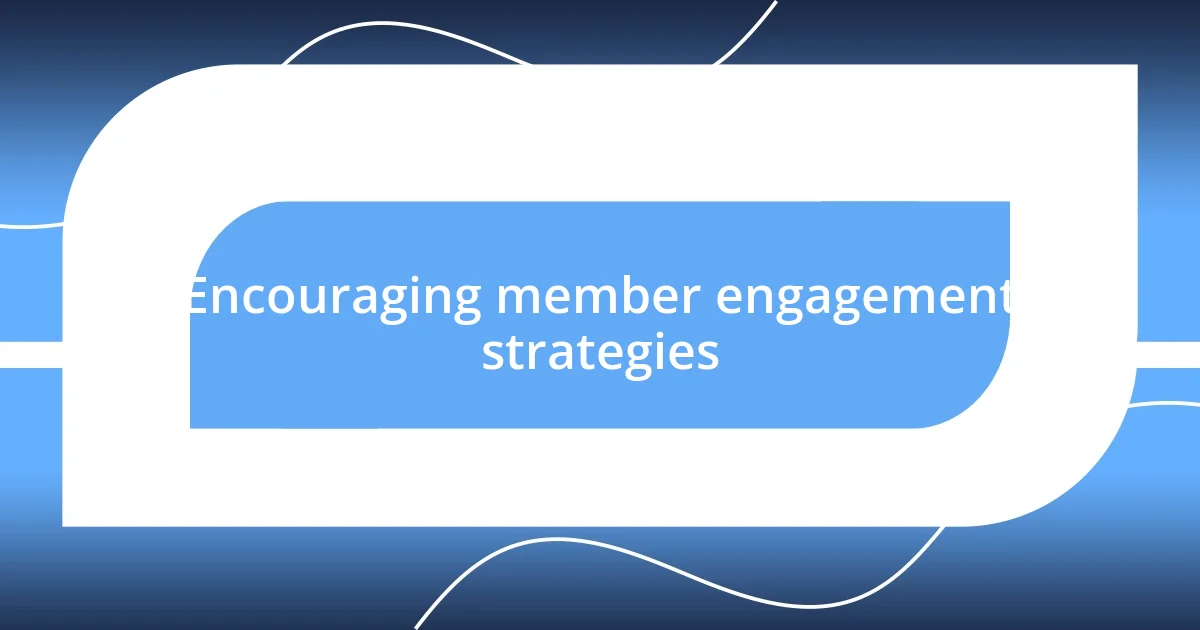
Encouraging member engagement strategies
Encouraging member engagement requires a keen understanding of what truly motivates your community. I recall a vibrant forum where I introduced weekly themed discussions. These sessions sparked enthusiasm and excitement; members eagerly awaited the opportunity to share their experiences around shared topics. The joy of seeing members engage deeply and support each other in these discussions was profoundly rewarding. It’s moments like this that remind me how vital it is to create spaces where people can connect on a personal level.
Here are some strategies I’ve found effective in fostering that engagement:
- Themed Discussions: Regularly schedule topics that invite personal experiences and insights.
- Recognition and Rewards: Spotlight active members with shout-outs or a member of the month program, creating positive reinforcement.
- Polls and Surveys: Ask for feedback on forum topics or features, making members feel valued and involved in decision-making.
- Interactive Content: Introduce quizzes or challenges related to your niche to keep the community lively and involved.
- Events and Webinars: Host virtual meet-ups or expert talks that encourage real-time interaction and networking.
Adopting these strategies not only invigorates the forum but also strengthens the bonds among members. I felt a rush of joy when I saw newcomers forming friendships, sharing laughter, and creating memories—proof that a little encouragement can go a long way in building a thriving community.

Moderating discussions for quality
Moderating discussions to maintain quality involves more than just keeping the peace; it’s about fostering a productive environment that enhances engagement. I’ve seen firsthand how establishing a positive tone can set the stage for constructive conversations. For instance, when I noticed heated arguments breaking out over differing opinions, I decided to step in with a gentle reminder about the value of understanding diverse perspectives. This not only cooled the flames but also encouraged members to share their thoughts more thoughtfully. Can you imagine the shift when instead of conflict, we create a space for open dialogue?
Another critical aspect of moderation is actively participating in discussions. I learned this when I began sharing my insights in threads; it changed the dynamics entirely. Instead of waiting for members to initiate quality discourse, my involvement stimulated richer conversations. That’s when I realized—what if moderators viewed their role not just as overseers but as engaged community members? This transition spurred more lively exchanges and encouraged everyone to contribute meaningfully.
Finally, regular feedback loops can significantly improve the quality of discussions. In one of my groups, we implemented monthly check-ins where members could express their thoughts on recent topics and moderation styles. I remember the first session vividly; there was a mix of hesitance and excitement as members shared their suggestions for improvement. It was powerful to witness how open lines of communication not only boosted the quality of our discussions but also fostered a sense of belonging. Who knew that simply asking for feedback could lead to more vibrant and enriching conversations?
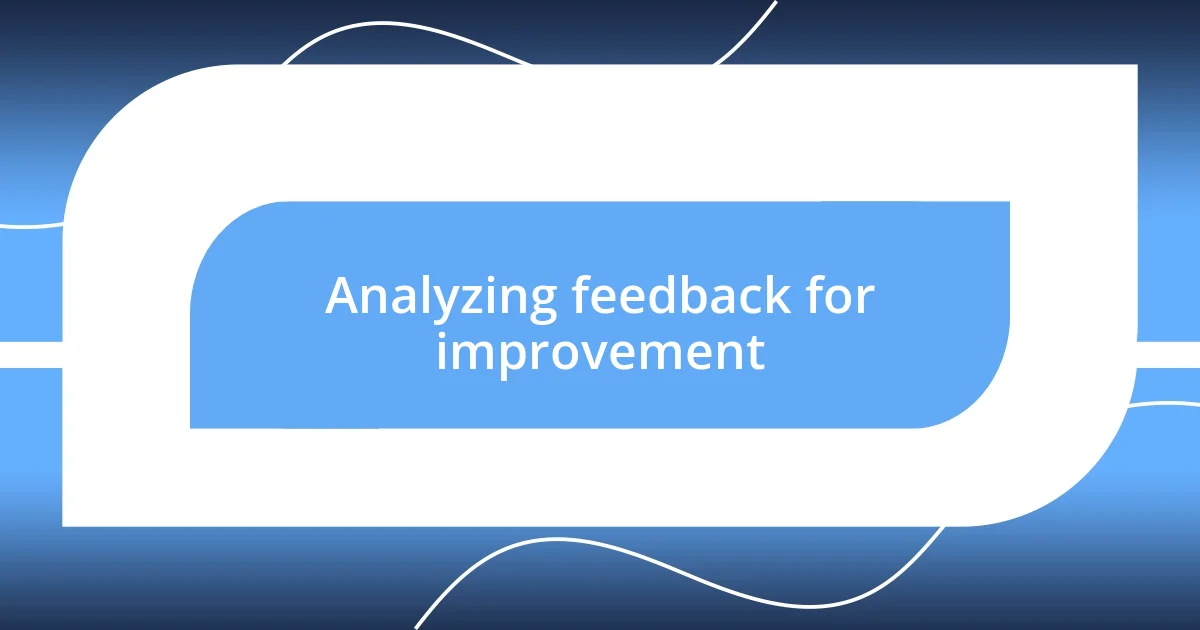
Analyzing feedback for improvement
Analyzing feedback for improvement is a cornerstone of effective forum management. I remember one instance where we gathered comments about forum features through a simple survey. The overwhelming response revealed a desire for more multimedia content; members were craving videos and infographics. It’s incredible how a straightforward question can unlock such valuable insights, right?
As I delved into the feedback, I started noticing patterns that many might overlook on first glance. For example, several members expressed frustration with navigating our layout. Instead of dismissing this as just a few disgruntled voices, I took it personally. Their concerns helped me understand the importance of user experience. This led me to propose a redesign, one that prioritized ease of use, reinforcing the idea that we must listen actively to create a welcoming environment.
What struck me most was how engaging directly with our community after implementing changes created a deeper connection. I posted updates on our new features and encouraged members to share their thoughts. The response was overwhelmingly positive, and I felt a sense of accomplishment. It made me wonder: isn’t it remarkable how open communication can transform a forum from merely a collection of posts to a vibrant community? The joy of seeing members not only appreciating the changes but actively participating in further discussions has been one of the most fulfilling experiences of my journey in forum management.
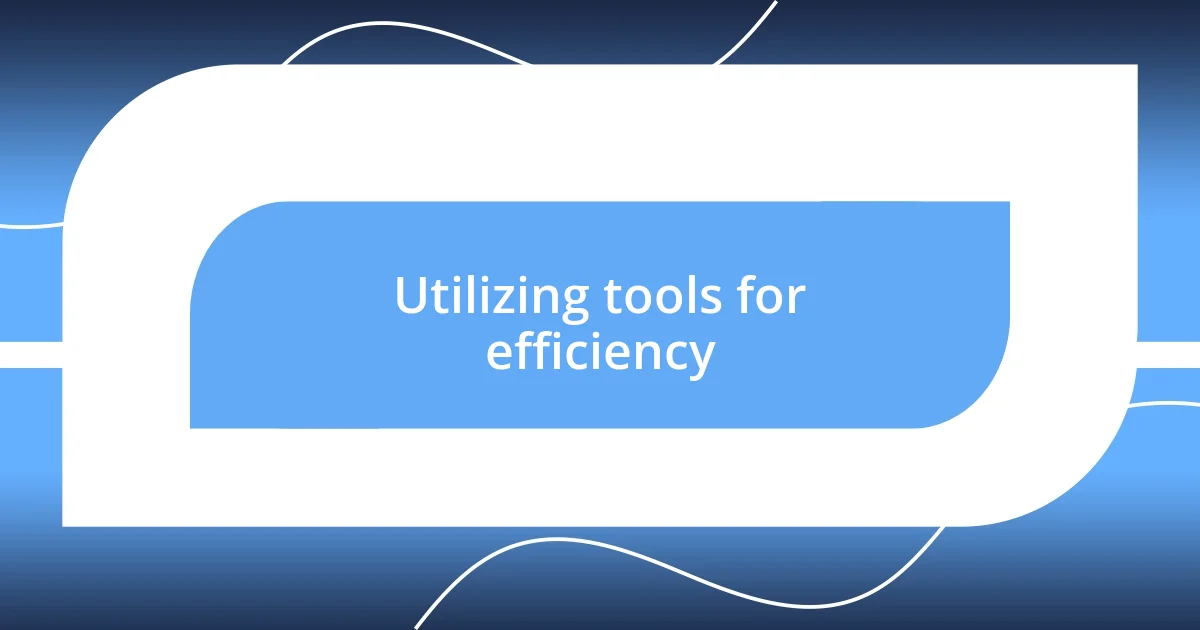
Utilizing tools for efficiency
Utilizing the right tools dramatically enhances efficiency in forum management. For instance, I’ve integrated moderated software that allows for real-time monitoring of discussions. When I first started using it, I was amazed at how quickly I could identify problematic threads, which saved me countless hours of backtracking. Isn’t it exhilarating when technology gives you an edge to keep the community thriving?
I also found that organizing threads with classification tools can simplify navigation for users. I remember a time when our forum felt overwhelming with information. I implemented tagging and sorting features, which not only made it easier for members to locate topics but also encouraged more interaction. It was like opening a door to a new room in a familiar house—everything felt more accessible.
Moreover, leveraging analytics tools provides insights into member engagement. One particular report revealed peak activity hours when my involvement mattered most. I decided to schedule my participation during those times, which sparked vibrant conversations. It reminded me just how powerful data can be in shaping our actions. What choices are we missing when we neglect to utilize the tools at our disposal?
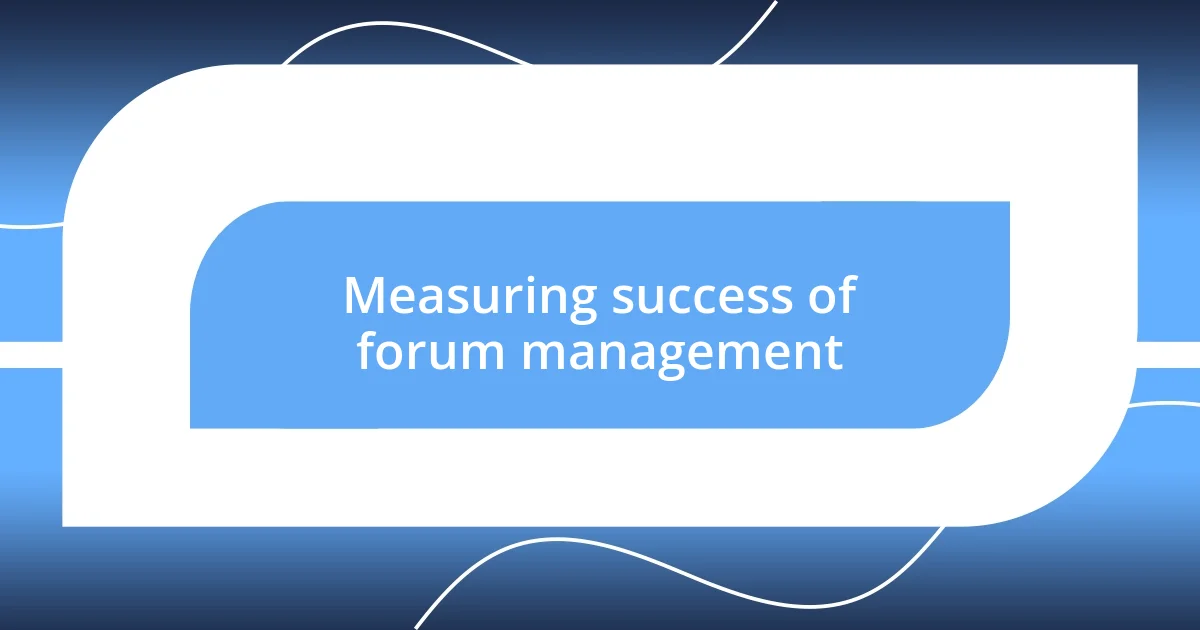
Measuring success of forum management
Measuring the success of forum management often hinges on key performance indicators that resonate with the community’s experience. I’ve always found it helpful to track metrics such as engagement rates—how often members post, comment, and interact with each other. I recall the excitement when I noticed a steady increase in active participants after introducing a themed discussion week. It felt like we had struck a chord, transforming the forum into a lively hub of conversation.
Beyond just numbers, the sentiment around discussions is a vital measure. I remember analyzing sentiment through comments; many users expressed feelings of camaraderie and support. It struck me how essential it is to not only quantify success but also to grasp the emotional connections forming within the threads. Have you ever felt that rush of satisfaction when you see members rallying together over shared interests? It’s those moments that highlight the heart of our efforts in managing forums.
Another insightful way I’ve gauged success is through member retention and growth. Seeing familiar names return consistently brings a certain warmth, as it indicates a sense of belonging. Once, after hosting a community challenge, I noticed a significant uptick in new registrations. This not only filled me with pride but also reinforced my belief in creating engaging content that resonates with members. Isn’t it fascinating how a well-timed initiative can lead to both growth and a stronger community bond?














